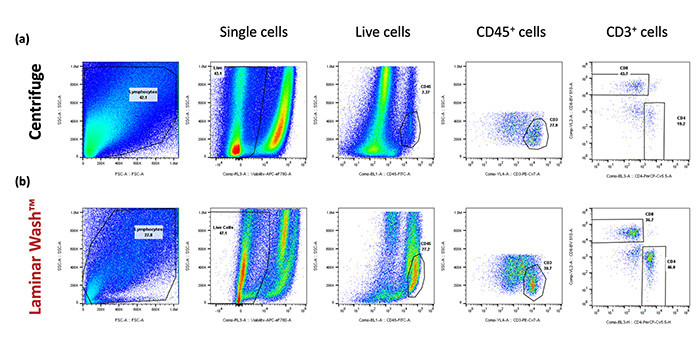即将举行的网络研讨会:实现无需离心的流式细胞术样品制备工作流程的标准化
Immunotherapy, a treatment that harnesses the patients’ own immune systems to fight off cancer, is revolutionizing cancer treatment. Since the original success in melanoma, significant advances have led to novel immunotherapeutic approaches for treatment of various types of cancer, with a large number of clinical trials being currently underway. The successful anti-tumor immune response is largely driven by the tumor infiltrating lymphocytes (TILs), which are shown to have a prognostic and predictive value in controlling cancer growth.
The naturally occurring TILs exist in a complex microenvironment containing the extracellular matrix, blood vessels, and stromal and endothelial components in addition to various immune cells. While a growing number of preclinical mouse models is under development, the heterogeneity of the cell composition in a solid tumor poses considerable technical challenges in isolating and characterizing the TILs for the downstream analysis. One common problem with TILs preparation occurs during solid tumor dissociation, whereby the TILs are left in a mixture with tissue debris and dead cells in suspension. Consequently, a preparation of autologous TILs often requires further costly and laborious processing such as density gradient centrifugation, immune cell sorting and enrichment, and dead cell and debris removal in combination with multiple centrifugation steps. These unique set of challenges can be ameliorated by the use of the Laminar Wash™ technology.

(a) Centrifuge wash method – cell loss and mechanical stress through sequential pelleting and resuspension
(b) Laminar Wash™ method – less tumor debris, but higher retention of TILs and better resolution of populations
The Laminar Wash™ system allows live cells to settle by gravity followed by a gentle and continuous flow of a fluid across the wells. Contrary to the conventional centrifugation method, the Laminar Wash™ system can effectively remove the floating debris in suspension while keeping the live cells unperturbed in each well. On the Laminar Wash™ plate, the individual cells are washed in a monolayer instead of forming a single pellet, which helps cell surface architecture and epitopes better retained for improved downstream analysis with flow cytometer. Laminar Wash™ results in healthy, viable, and well defined population of TILs, while enhancing the overall quality of data.



